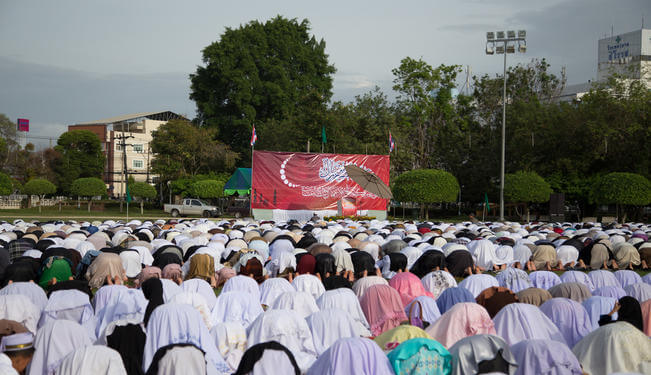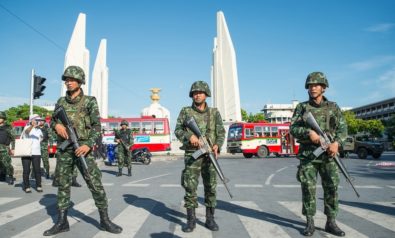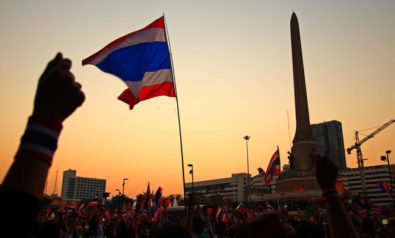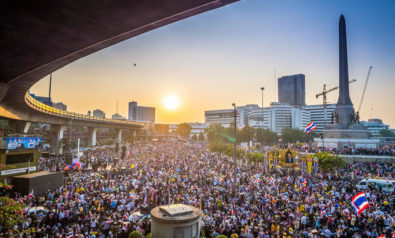Unrest in Thailand could influence political developments in Malaysia.
Thai-Malaysian relations have in the past decade been predominantly shaped by the situation in the three southernmost provinces of Thailand. In 2004, under the Thaksin Shinawatra administration, an Islamist insurgency re-erupted, seen in the incidents at Krue Sae Mosque in Pattani, where 32 Muslim militants were executed, and at Tak Bai district in Narathiwat, where 78 Muslim detainees suffocated to death while being transported to a military camp.
But the real turning point in Thai-Malaysian relations took place in August 2005, when 131 Thai Muslims fled across the border into the Malay northern states. Reportedly, Malaysian Foreign Minister Syed Hamid Alba agreed to release them only if Bangkok could "guarantee" their human rights and safety. Thaksin was infuriated, perceiving his remarks as interfering with Thailand's internal affairs.
Malaysia subsequently proposed a dialogue to resolve the problem as a means to defuse tensions. Accordingly, then-Malaysian Prime Minister Abdullah Badawi and former Prime Minister Mahathir Mohamad held informal discussions with former Thai Prime Minister Anand Panyarachun, who was then the head of the National Reconciliation Commission. They reassured Anand that Malaysia did not support the separatist movement in Thailand.
However, the complexity of Thai politics and its impact on the issue of the southern conflict has continued to influence bilateral relations. As Thailand attempted to isolate its southern conflict, it also isolated Malaysia. Such isolation reflected on a Thai policy of externalizing the cause of conflict, and Malaysia was painted as a prime manipulator behind the Thai Muslim insurgents.
In December 2009, Malaysian Prime Minister Najib Razak, in striving to improve ties with Thailand, made a high-profile visit to Narathiwat. Razak said:
"I don't expect things to change overnight. This is a journey, but there is a commitment and plans by Thailand to move toward a comprehensive solution. Malaysia's stand is to be a partner who will respect that this is domestic, and the message is clear that the people of Thailand must be loyal to the country."
Clearly, Razak's mission was to dispel the existing mutual distrust. At the end of the meeting, the two countries initiated a number of joint projects to rebuild Thailand's southern region. For example, Thai Muslim teachers were to be trained in Islamic teachings in Malaysia, while Thai businesses were invited to visit Malaysia with the possibility of investing in the country.
In June 2013, peace talks between the Thai government and members of the Barisan Revolusi Nasional (BRN) reached a milestone when the two parties decided to sit down and discuss ways to rebuild mutual trust, eliminate suspicion, and find a long-lasting solution to the protracted conflict. Malaysia hosted the peace talks in Kuala Lumpur, signaling a new role as a peace mediator.
Malaysian Defense Minister Hishammuddin Hussein told the media that he was hopeful of progress through development of the southern provinces: "The issue of development, poverty, fair treatment of everybody — those are the issues to be navigated by both sides based on trust. Building up trust is the difficult part."
Until recently, Thai Prime Minister Yingluck Shinawatra has tried to reach out for peace with the Thai Muslim community and for better ties with Malaysia. There were obstacles to the government's efforts. For one, local Thai Muslims could not forget what her elder brother, then-Prime Minister Thaksin Shinawatra, did in 2004.
In the political context, the south has never been the territory supportive of the ruling Pheu Thai Party, but instead, are long-time supporters of the Democrat Party — the current opposition party.
The Thailand Crisis
Thailand has fallen into another crisis and Yingluck's resolve will once again be tested. It has been more than five months since the antigovernment protesters seized Bangkok, driving Yingluck to dissolve the parliament. General elections were held but outcomes were inconclusive. The Yingluck administration is now in a limbo. The Thai political situation is unpredictable, to say the least.
Daily killings in the restive south, meanwhile, have been normalized. The more Bangkok is preoccupied with other domestic crises, the longer the insurgency will prolong in the south. Since the last meeting between the government and the BRN, the Thai public has been kept in the dark regarding progress on peace talks. If the violence escalates in the Thai south, it will further complicate Bangkok politics and Thailand's relations with Malaysia.
Insurgency issue aside, democratic and anti-democratic movements in Thailand could also impact Malaysia. Political power in Thailand, long-dominated by the old elite, are now being seriously challenged by new political alternatives. The end game could be traumatic. The imminent royal transition could serve to exacerbate the already fragile situation.
In Malaysia, the United Malays National Organisation has been in power for far too long. It has been too inert, complacent and perhaps too authoritarian. The Thai example could influence political developments in Malaysia, particularly through the rising political awareness of the Malaysian masses and their demand to gain better access to political resources, economic wealth and better social status. Like Thailand, it will be interesting to see where Malaysian politics would be heading toward — reforms or struggle.
*[This article was originally published by New Mandala.]
The views expressed in this article are the author's own and do not necessarily reflect Fair Observer’s editorial policy.
Image: Copyright © Shutterstock. All Rights Reserved
Support Fair Observer
We rely on your support for our independence, diversity and quality.
For more than 10 years, Fair Observer has been free, fair and independent. No billionaire owns us, no advertisers control us. We are a reader-supported nonprofit. Unlike many other publications, we keep our content free for readers regardless of where they live or whether they can afford to pay. We have no paywalls and no ads.
In the post-truth era of fake news, echo chambers and filter bubbles, we publish a plurality of perspectives from around the world. Anyone can publish with us, but everyone goes through a rigorous editorial process. So, you get fact-checked, well-reasoned content instead of noise.
We publish 2,500+ voices from 90+ countries. We also conduct education and training programs
on subjects ranging from digital media and journalism to writing and critical thinking. This
doesn’t come cheap. Servers, editors, trainers and web developers cost
money.
Please consider supporting us on a regular basis as a recurring donor or a
sustaining member.
Will you support FO’s journalism?
We rely on your support for our independence, diversity and quality.








Comment